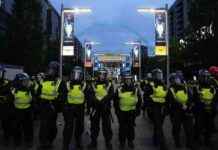The Crackdown on Football Banning Orders Ahead of Euro 2024
The excitement of the football season is in full swing with the upcoming Euros, but for nearly 200 football fans, the anticipation has been met with disappointment as they have been served banning orders by the police. The Met Police’s football policing unit has been working tirelessly to ensure the safety and security of matches, resulting in a record-breaking 197 football banning orders issued last season. These orders come as a response to various offenses committed by fans, ranging from public order offenses to drug possession and assault.
The Impact of Banning Orders on Fans
For those fans who have been issued banning orders, the consequences are severe. The majority of these individuals will be required to surrender their passports to the police, effectively preventing them from traveling to Germany for the Euro 2024 tournament. Additionally, depending on the type of order issued, fans may also be barred from entering the vicinity of domestic stadiums or towns on match days. This restriction not only affects the individuals involved but also serves as a warning to others who may be considering engaging in similar behavior.
The Met Police’s efforts have not gone unnoticed, with Chief Inspector Pete Dearden commending the football policing unit for their dedication and hard work in securing these banning orders. He emphasized the importance of maintaining safe spaces for all attendees at football matches, highlighting the passion of fans while also ensuring that disorderly conduct is not tolerated. The collaboration between the police and football clubs has been instrumental in identifying and addressing individuals who pose a threat to the safety and security of matches.
Types of Offenses Leading to Banning Orders
The banning orders issued by the Met Police cover a range of offenses, including public order offenses, drug possession, assault, and football-related misconduct. In April alone, the Met applied for 79 banning orders to safeguard matches in London and prevent disorderly conduct. Of particular concern were incidents of tragedy chanting and racially aggravated public order offenses, which resulted in eight bans each being issued. The crackdown on such behavior reflects the zero-tolerance policy adopted by the police to ensure a safe and enjoyable experience for all fans.
In addition to public order offenses, the Met Police has also targeted fans found in possession of Class A drugs, imposing 51 three-year bans last season. This proactive approach aims to deter individuals from engaging in illegal activities and maintain the integrity of football matches. Furthermore, bans have been issued for assault and football-related offenses such as throwing missiles or flares onto the pitch, highlighting the importance of upholding standards of conduct at sporting events.
As the Euros approach, the focus on preventing disorder and misconduct is paramount. With fans eagerly anticipating the tournament, the police have ramped up efforts to identify and address any potential threats. Chief Inspector Pete Dearden reiterated the commitment of the football policing unit to ensure the safety of matches in the capital, emphasizing the collaborative approach taken with clubs to enforce banning orders for disruptive fans. The proactive measures implemented by the police serve as a deterrent to those who may seek to disrupt the peace and enjoyment of football events.
In conclusion, the issuance of 197 football banning orders by the Met Police reflects a concerted effort to maintain order and safety in the lead-up to Euro 2024. The severity of the consequences for fans found in violation of the law underscores the commitment of law enforcement to uphold standards of conduct at football matches. As fans gear up for the tournament, the message is clear: disorderly behavior will not be tolerated, and measures will be taken to ensure a safe and enjoyable experience for all attendees.





















